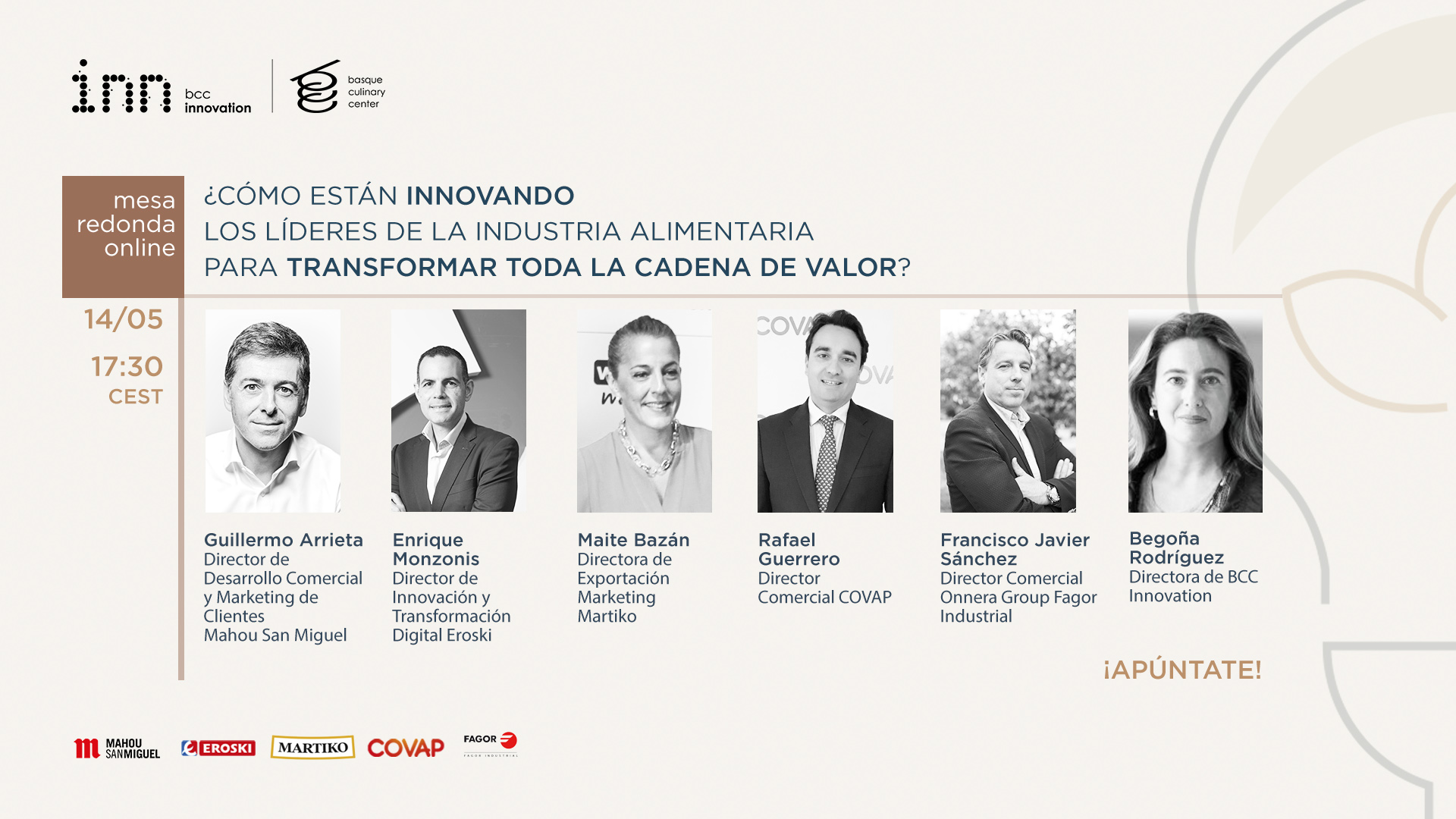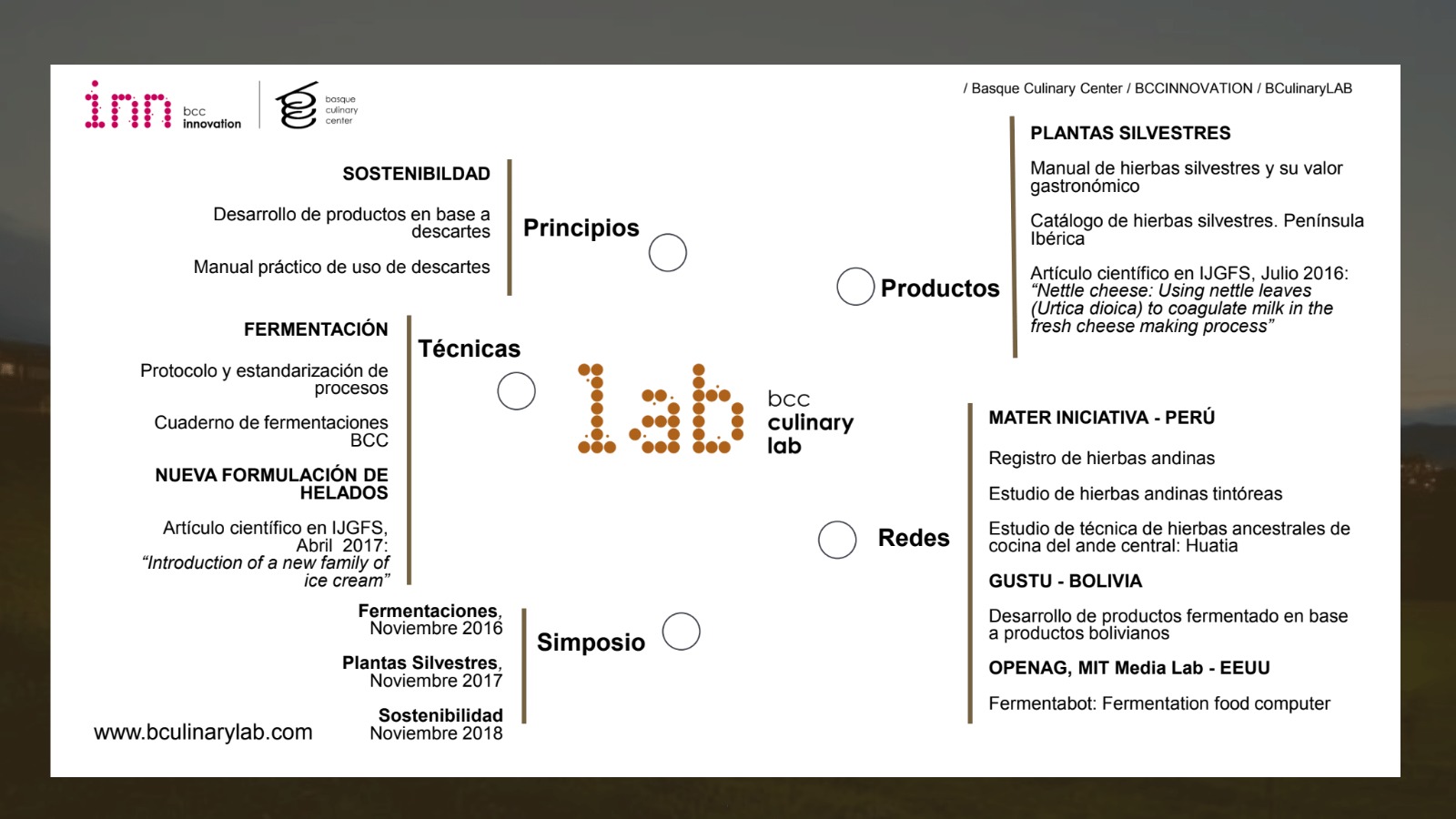Top international chefs and leading gastronomic figures share their vision of gastronomy in the post-coronavirus world
Internationally-renowned chefs from the gastronomic world shared how they are responding to the Covid-19 pandemic, its impact on the restaurant industry, stories of community support initiatives, and discussed what lasting change gastronomy’s response to the pandemic could have on the industry and wider society in a virtual discussion held yesterday.
Sasha Correa, from the Basque Culinary Center, who chaired the event, said:
“We need to focus not only in what is urgent now, but also in the opportunities we can take from this. Regaining a sense of normality is not as simple as returning to what we had before. It's not about how we go back to what we had, but how we move forward, how we become more resilient. To do that we should adapt and build future scenarios in line with the needs of a world like the one that is suffering from the effects of coronavirus today.”
The online event was hosted by the Basque Culinary World Prize (BCWP), an annual prize created and awarded by the Basque Culinary Center and the Basque Government to a trailblazing chef creating an impact “beyond the kitchen”.
Nominations are open until Wednesday 1 July for this year’s prize, which because of the current pandemic will include a significant focus on chefs that have addressed the impact of coronavirus on the culinary industry and wider society.
The chefs taking part were BCWP jury member Eneko Atxa (Basque Country), of the three-Michelin-starred Azurmendi, regularly named in the World’s 50 Best Restaurants list; Anthony Myint (USA) and Maria Fernanda di Giacobbe (Venezuela), winners of the BCWP in 2019 and 2016 respectively; BCWP finalists Ebru Baybara Demir (Turkey); David Hertz (Brazil) Basque Culinary Center Foundation board member Diego Guerrero (Madrid); Elijah Amoo Addo (Ghana), chef and social entrepreneur; and two Basque Culinary Center alumni, Silvia Rozas and Marco Zambon.
Eneko Atxa said:
"We can be part of the solution. I understand gastronomy as a medicine capable of strengthening our health, our spirit and our culture, but also our economy. That's why we must take our knowledge and use it in this context to find solutions. There will always be interest in fine dining; in life, we are just passing through, we want to find happiness and we try to provide that in our restaurants. Fine dining will change its clothes after this: it will still exist, I just do not know which specific dress it will wear.”
David Hertz said:
“Social gastronomy never made so much sense. It's time to focus on the essential and practice generosity. The concept of the solidarity kitchen – this our response to COVID-19. In a country like Brazil, it’s impossible to lockdown favelas – people are more worried about their jobs than the virus. We have to get involved now more than ever.”
Maria Fernanda di Giacobbe said:
"In moments of difficulty you become stronger. Limitations force you to look for solutions and in Venezuela this is what we have done over the last decades, even when we have lacked the most essential things: electricity, water, basic products like milk, flour, corn. At this moment, the community is united despite the fact that the entire production chain is broken."
Elijah Amoo Addo said:
"In Ghana, people are fighting the COVID-19 but at the same time, hunger is growing. For many people in my country, going hungry is worse than getting the virus. This is why the struggle is so hard. We have years of experience helping to feed those in need, recovering surplus food from supermarkets, restaurants, and other sources. One of the most affected groups in this context is those working in hospitality - 40% of Ghana's workforce. Those who normally provide food such as young waiters and cooks have lost their jobs and have no economic support. Today they need help, so we are working on giving them warm meals.”
Diego Guerrero said:
“The place of a chef goes beyond the kitchen. In Madrid, there’s a big need for meals to be delivered in this crisis. I wanted to contribute with what I do: cooking. So, I started collaborating with World Central Kitchen, to provide food for healthcare workers facing the emergency. For me it is not a romantic or heroic thing, it's about getting involved in the solution of a big problem that connects us all. The sooner we solve it together, the sooner each individual will benefit.
“Facing the paralysis and the way our restaurants had to temporarily close – which meant having no income – we are seeing that, in Spain, reopening could cost us more than being closed. We have to be more cautious than ever. Beware of those who want to open sooner, they might be first ones to close again. We have to understand that the crisis affects everyone's business. Personal wellbeing comes from the collective one; this is no time to act alone. Either we all get together, or we won’t overcome this.”
Douglas McMaster said:
“In the circumstances we face there is great uncertainty in the immediate future, which begs us to look at the bigger picture. Hopefully a more sustainable future. This is definitely not the last ecological catastrophe. There is a much greater storm coming and it's climate change. The rate of change is far too slow, it would seem the only way to make this change occur is the storm itself.
“This is an opportunity to think. I’m focusing my attention on an online learning platform to turn zero waste into a mainstream idea that is accessible to everybody. I’m working very hard to make it simple. This is my current project. It’s disruptive to our industry – you innovate or die. We are being forced into a decentralized network of activity. This means we will come to future catastrophes with more resilience.”
Anthony Myint said:
"In San Francisco the restaurant industry is on life-support. The city had a lot of challenges. At some point soon everyone will have to consider how to create a new normal. This crisis exposes that there is no cushion, there is no safety net, there is no margin for error. Our individual businesses need to be resilient, our food system needs to be resilient. That is one take away from the pandemic. It’s the ability to produce food in a natural way.”
Ebru Baybara Demir said:
“There is a way of turning a crisis into an opportunity. We have set up the production of soap with refugee women to give them an income. We are producing 25,000 pieces and production is continuing. We are reaching more followers, collecting orders via social media and delivering via shipping”
“Social gastronomy is more important than ever. Syrian refugees are helping local farmers as some have knowledge and methods to share that can make agriculture more sustainable and reduce production costs. We are training farmers in keeping social distancing when they are getting the harvest in.”
Silvia Rozas and Marco Zambon (BCC former students) said:
“We knew about this “Food 4 Heroes” initiative, so on Easter Day – when everyone gathers with their family – we decided to donate the Easter meal to the hospital in Venice, helping health-workers. It was a very joyful moment for us. We decided to take a step back and develop products using local raw materials and helping people who were really impacted by this crisis.
“We are contributing by helping small producers to preserve their harvests and crops, instead of losing them. In order to do so, we are making products that can be produced today and consumed in the future. We are making preserves, etc. In this sense, we are contributing by using culinary innovation as a tool to create solutions that highlight certain products or elaborations. We are doing so in the most sustainable way possible, helping producers to eradicate food waste."
Arantxa Tapia, Minister of Economic Development and Infrastructure in the Basque Government, highlighted that:
“Euskadi has seen how the COVID-19 pandemic has generated a great impact by causing a health, social and economic crisis. One of the realities that COVID-19 has brought to the surface is the need to ‘guarantee’ food supply, from agricultural production to the end consumer.
Facing this scenario, we need to take advantage of the fact that now more than ever society has understood the importance of having a strong food supply chain, which is able to provide local product guaranteeing the necessary health measures and quality. The uncertainty that we face implies that we need to continue with initiatives such as BCWP and conferences like the one held today, which show that the world of gastronomy is willing to face new challenges with creative solutions”.
Joxe Mari Aizega, Director of the Basque Culinary Center, said:
“Since its inception in 2016, the Basque Culinary World Prize has highlighted gastronomy as a global phenomenon that has become a transformative force of society. It is through gastronomy that we can confront and offer solutions to the challenges faced by contemporary societies.
“There is no bigger challenge than the Covid-19 pandemic. It is the defining issue of our times and with the culinary world disproportionately affected than many other sectors, it is right that this year to seek nominees that reflect the active role that chefs have as agents of social change in relation to the pandemic.”





